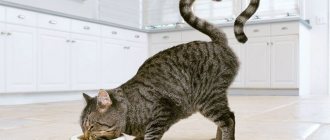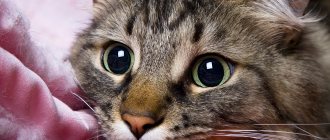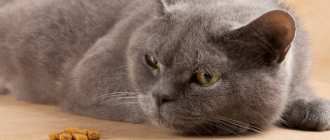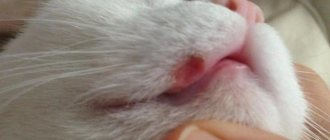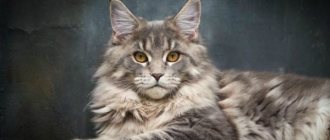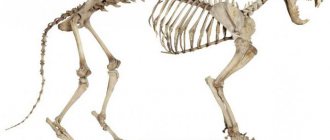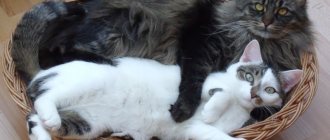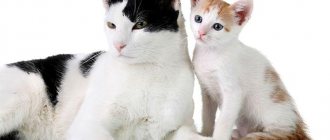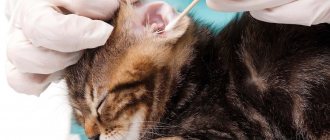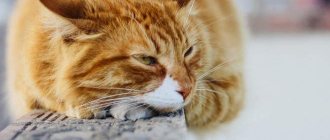Before deciding how to increase your cat’s appetite, you should first understand the reason for its absence. This may be due to natural causes or illness. Even if the animal looks healthy outwardly, if it refuses food for a long time, be sure to show it to the veterinarian.
Hunter by nature
These animals cannot calmly pass by a bird's nest or a hole in which hatched mice squeak. Therefore, before you think about how to increase your cat’s appetite, you need to observe what your pet is doing during the day. It is quite possible that he has already had enough of the caught prey and therefore ignores the offered bowl.
This behavior is typical for animals that have free access to walks and the street. This is no cause for concern. Usually, within a few days the animal will empty the found nest, after which it will begin to eat in its usual volume. You don’t even have to worry about how to increase your cat’s appetite.
Why is there a problem?
Physiological reasons
Often a cat’s poor appetite is associated with dirty dishes or the selection of a low-quality bowl for eating food. There are other natural factors that lead to a cat’s reluctance to consume food:
- Increased air temperature. Loss of appetite often occurs in the summer during hot weather. In this case, it is important to provide your pet with constant access to clean, drinking water.
- Sudden changes in the cat's diet.
- Change of feeding place. If the owners constantly rearrange the cat's bowl, then the cat may lose its appetite completely or partially. To fix the problem, simply return the cat's plate to its place.
- Impact of stress.
- Aging of the body. With age-related changes, the pet becomes lethargic, moves less and there is a decrease in appetite.
- Hair accumulation. Cats are clean animals and love to lick themselves constantly, which is why a lot of hair collects in the stomach. In this case, the cat’s lack of appetite can also cause vomiting and problems with stool.
Veterinarians note that during puberty, an animal may lose its appetite for several days, and sometimes even a week. At the same time, owners should not worry, since the disorder will go away on its own after estrus.
Pathological factors
If the cat has lost its appetite and has lost a lot of weight, this may indicate the development of the disease. The following pathologies are identified that influence the reluctance to eat food:
- infection with small parasites;
- diabetes;
- heart diseases;
- kidney failure;
- intestinal obstruction;
- inflamed upper respiratory tract and paranasal sinuses;
- anemia;
- diseases associated with tooth decay;
- inflammation of the pancreas;
- leukemia;
- inflammatory reaction in the intestines;
- pills and other drugs that negatively affect the cat’s appetite.
Return to contents
Watching the animal
In itself, reducing the amount of food consumed is not critical. But if, along with a lack of appetite, you notice other changes, for example, in behavior, then most likely the reason lies in your pet’s illness. There can be a lot of reasons for this. Sometimes this condition is caused by a mild cold or the presence of parasites. In this case, it is very easy to correct the situation at home, without even resorting to the help of a veterinarian.
It’s another matter if the cat begins to eat less due to developing respiratory diseases, digestive tract problems and diarrhea. These are all quite serious problems that require the intervention of a veterinarian. Do not forget that the clinical picture may be blurry, so it is best to be examined by a doctor and take the necessary tests. Perhaps the cause is gastrointestinal disease or dental disease. Suffering from pain, the animal refuses to eat, so treatment should begin only after diagnosis.
Diseases
If the appetite has disappeared and the cat is lethargic, these may be symptoms of any diseases:
- infections;
- inflammatory processes;
- development of benign or malignant tumors;
- dysfunction of the liver, intestines or stomach;
- oral diseases.
Such pathologies lead to anorexia (complete lack of appetite), which can lead to depletion of the body. Therefore, if your appetite has disappeared for no apparent reason. You should immediately contact a veterinary clinic for examination.
Proper nutrition
It's no secret that the key to a good appetite is a healthy stomach. So forget about feeding cats milk. This is a predator that needs fresh meat, poultry or mice. To keep your pet’s digestive system normal, feed her one raw yolk a couple of times a week. A professional food for sensitive digestion wouldn’t hurt either. But even this cannot be given to an animal on an ongoing basis. And even more so, soups, leftovers from our table, fatty broths, salty and sweet foods are not suitable for cats. Take care of your pet's body. She needs meat and fish, grains and greens in small quantities. The latter would be catnip. What is it for? This is a kind of stimulant and drug, but in small quantities the herb can improve digestive processes. Therefore, you only need to give it a few leaves.
Provoking a good appetite
Pet stores today sell quite a lot of cat vitamins, which include seaweed and catnip, yeast and other beneficial substances. They are designed specifically for pets. These are appetite stimulants for cats that improve metabolism.
Many cats love to eat sprouted grass. It also improves the animal's appetite and strengthens the immune system. You can buy sprouted grass at a pet store or grow it yourself. It's no secret that the key to a good appetite is a healthy stomach. Therefore, you need to monitor your pet’s nutrition from a very early age and try to keep it in the best possible condition.
If poor appetite is associated with stress, then catnip will be a good help. What is it for? It has a positive effect on the body, calms and helps relieve stress. Moreover, the grass is completely harmless to digestion. Many medications to increase appetite in cats contain extracts of this plant, due to which they give excellent results. The plant has only one drawback: it cannot be used often, because otherwise it becomes addictive.
Diseases
Even the healthiest body is susceptible to external ailments. For example, anorexia is the loss of olfactory and taste buds, which leads to rapid weight loss. It develops against the background of other diseases and, in fact, is only a consequence of deep-seated lesions in the body. Let's look at the most common cat ailments that lead to loss of appetite:
Parasite infestation
Pathogenic microorganisms exhaust the cat, taking away most of the nutrients. The body suffers from a lack of vitamins, the pet is rapidly losing weight.
The main symptoms include: discharge from the eyes, bloating, dull fur, problems with going to the litter box, and diarrhea alternating with constipation. Stool in blood or mucus. In extreme cases, convulsions, an unsteady gait, and even loss of consciousness are observed.
Veterinarians most often prescribe the following drugs - Troncil K, Pyrantel, Prazitel, Dirofen, Polyvercan and many others. Self-medicating is a bad idea. If improvement is not visible, you should contact the clinic.
Gastrointestinal problems
Poor appetite is most often caused by diarrhea or constipation. Side symptoms include apathy, lethargy, and uterine rumbling. Even the kindest cat can become aggressive due to severe stomach pain. In most cases, the pet is silent, only in advanced cases it purrs protractedly. The cat has difficulty breathing and an increased pulse.
The main indications for treatment are a strict diet and medication. From tablets, various types of corticosteroids are preferred. For example, prednisone. Many medications are used as intravenous injections. For example, stimulants such as tylosin or metronidazole.
Diabetes
It is also a common situation when a cat experiences loss of appetite. The animal is constantly thirsty, drinks a lot of water, and eats very little. The main symptoms include the following:
- the cat has an unsteady gait and occasionally stumbles;
- the pet sleeps a lot, experiences weakness, apathy, lethargy;
- The acrid smell of acetone emanates from the mouth.
To improve the situation, doctors prescribe a special diet with a low carbohydrate content. In some cases, intravenous insulin injections are prescribed.
Kidneys
Kidney failure is accompanied by thirst, apathy, loss of interest in usual activities - favorite toys, attention from family members. Veterinarians cleanse the body of toxins. For example, using intestinal dialysis.
ATTENTION! A strict diet controls mineral balance. If necessary, stimulants are used to maintain or long-term blood cleansing.
Teeth
Oddly enough, cats also experience oral problems. Animals are carnivores by nature and do not pay much attention to brushing their teeth. Among the obvious symptoms, inflammation of the gums is noted; the pet constantly rubs its face with its paw. Teeth turn yellow.
Veterinarians prescribe a diet with a predominance of soft or liquid food, as well as a specialized course depending on the disease . For example, putting a filling on a tooth.
Anemia
Characterized by general lethargy, the animal gets tired quickly and avoids active games. Obvious symptoms include rapid heartbeat, animal colic, heavy breathing, and diarrhea. The stimulants prescribed by the veterinarian contain a fairly high level of stabilizing substances: B vitamins, iron, cobalt copper. Liver meat is preferable in the diet.
Pancreatitis
The disease is characterized by profuse vomiting. The pet cannot even think about food, avoids going to the kitchen, and often hides in secluded places. Diarrhea is added to vomiting, the animal becomes feverish, and the mucous membrane turns yellow.
A light diet is prescribed. Medicines include antiemetics and heart medications. They are combined with intravenous injections of glucose or saline. solution.
Glomerulonephritis
The disease is characterized by fever. The cat experiences swelling, shortness of breath, vomiting, ascites and general weakness. There is a large amount of blood in the stool.
Treatment methods include not only a traditional gentle diet, but also enhanced control. Your pet should be protected from overheating and hypothermia, protected from trips, going outside, active games and unnecessary anxiety. Stimulating medications include antibiotics such as oxacillin and cephalosporin. For maintenance, ascorbic acid, tocopherol, and multivitamins are used. If necessary, drugs such as claforan, fotum, palin.
Leukemia
Accompanied by copious discharge from the nose and mouth, as well as severe vomiting. The animal is literally immobilized. As the disease spreads, the lymph nodes become enlarged. Leukemia can cause a severe cough with bloody or mucous discharge. Some experts report sneezing as if you have a cold.
Unfortunately, in this case there is no standard treatment regimen.
ATTENTION! All medications and drugs are prescribed strictly individually. Self-medication is strictly prohibited!
This is not a complete list of diseases that can cause poor appetite in a pet, but they are the most common.
Drawing attention to food
This is a fairly simple method that allows you to solve the problem and increase your appetite. You can attract your cat's attention with your favorite treats. This risks the animal being spoiled, but everything is good in moderation. You can offer food as food with a strong, characteristic odor that stimulates appetite.
Tuna or sardines are suitable for this purpose. Research shows that these are the types of fish that elicit the greatest response from cats. A few drops of catnip extract will further enhance this effect. An increase in the content of B vitamins in food has a similar effect. And best of all, create conditions that will awaken hunting instincts. Hang pieces of food on a string so that your pet has to work hard to get them.
What do cats like?
When you adopt a pet, you should be well aware that you are accepting a great responsibility. You must create an environment at home so that the animal feels comfortable, cozy and calm. Cats especially need this comfort. If a furry beauty feels in danger, if she is offended, then she may refuse food due to constant stress. This is a natural phenomenon. Therefore, look around again to see if your cat is really having a good life.
It should be noted that cats love to eat. And if the puppy needs to be given food on a schedule, then the cat likes it if there is always food in the bowl. Therefore, try to leave some dry food even at night. In addition, cats love to sleep, so provide them with a warm place. A well-rested pet will eat with great appetite. Finally, furry beauties love to play. Provide him with toys, boxes in which he can hide, mice and other paraphernalia.
What don't cats like?
If an animal loses its appetite, there are reasons for this. Cats really don't like to be grabbed and squeezed. They especially cannot stand being pulled by the tail, so if there are children at home and the cat has lost his appetite, perhaps this is the reason. But the complete absence of people is also traumatic for them. A cat definitely needs a portion of love every day. Cats do not like loud noise or scandals in the house. If they occur regularly, the animal may become stressed. These are scary clean people who can refuse to eat if the bowl is dirty.
Nervous system disorders
This is another common reason why a cat has no appetite. Cats and cats are quite sensitive animals. They react to almost any significant change in lifestyle, and sometimes the pet’s reaction can be unpredictable. Obviously, some situations are likely to cause stress, which explains why I lost my appetite:
- Moving to a new place. For example, a kitten that has been separated from a cat and settled in a new home is at risk.
- Long, hours-long journey.
- The arrival of a new pet.
- Birth of a child.
- Dangerous situations (for example, a fight with a cat, the threat of a dog attack, etc.).
- Insufficient attention from the owner, conflict atmosphere.
- Long-term absence of the owner (it is known that cats very often become attached to a specific person and do not like change).
In rare cases, cats lose their appetite even due to harmless reasons - changing the bowl, changing the location of the toilet or rest area. Therefore, it is worth analyzing whether there were any significant changes the day before. If the reason for loss of appetite is related to stress, it is necessary to give your pet as much attention as possible.
